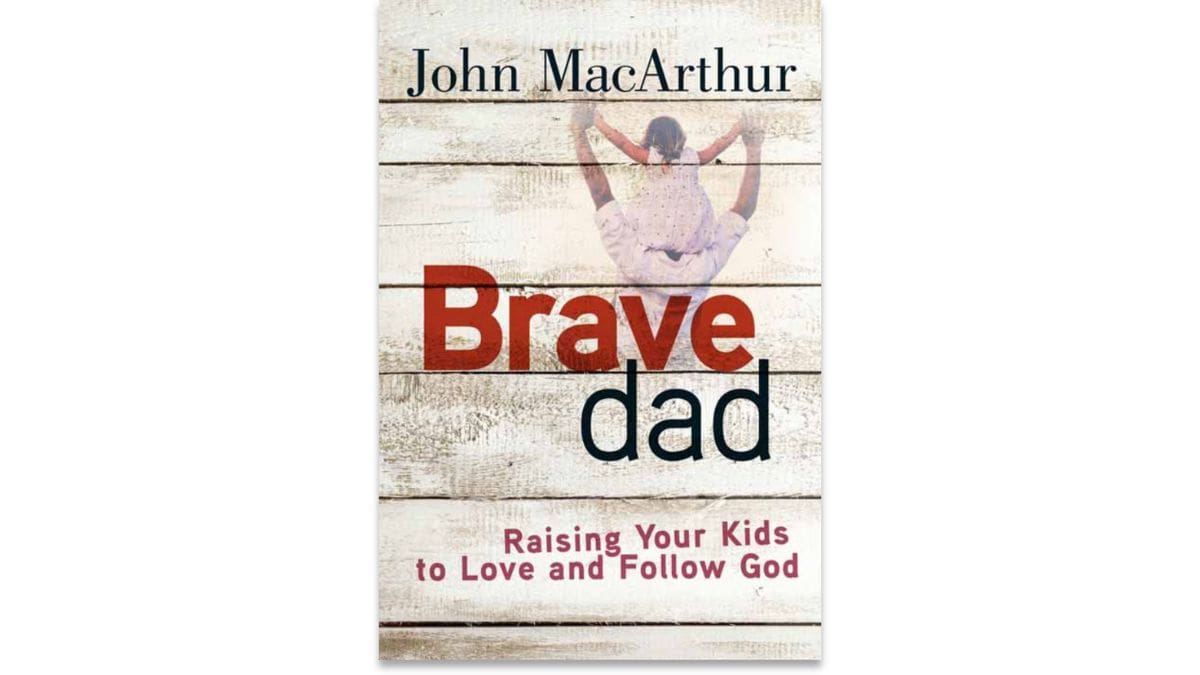Brave Dad: Raising Your Kids to Love and Follow God
By looking at different Bible passages, Brave Dad by John MacArthur encourages men to be strong and courageous as godly husbands and fathers.

Brave Dad is a 144 page book written by John MacArthur and published by Harvent House Publishers in 2014. John MacArthur has been the pastor-teacher of Grace Community Church in Sun Valley, CA for over 50 years. He and his wife, Patricia, have 4 married children and 15 grandchildren.
1. Purpose of Brave Dad
The purpose of Brave Dad is to remind Christian men that no responsibility is more sacred than a man's role as husband and father. And because of this, the author draws biblical truth from various sections of Scripture to help men understand their role as husbands and fathers and how they can love their wives and shepherd their children with diligence and strength.
2. Content of Brave Dad
In the introduction, MacArthur writes that "the father's duties are straightforward and fairly basic. What makes fatherhood seem difficult are our own inconsistenices and weaknesses. That's because parenting is first and foremost a spiritual task."
Chapter one starts with the premise that the supreme responsibility for the man in the family is loving his wife. Ephesians 5:25–31 is introduced, and the author expands on God's command for husbands to love their wives in a sacrificial way through consideration, chivalry, and communion. Husbands are also to love their wives by purifying them and caring and providing for them. This commitment to love our wives is for the long-haul, and the key to lasting marital bliss is a marriage where both spouses are practicing forgiveness.
Chapter two hones in on Ephesians 6:4. MacArthur acknowledges the challenge of raising children amidst a hostile external culture. To teach our children "in the discipline and instruction of the Lord" means that parents must evangelize their children at home. Our children need to see, hear, and understand the gospel of Jesus Christ.
- God is holy.
- Man is guilty of sin.
- Jesus is God but became man and our substitionary atonement.
- We must repent and place our trust in Christ alone.
Chapter three focuses on the negative and positive instruction of Ephesians 6:4. The negative instruction is for parents not to provoke their children to anger. The author gives ten examples how parents may inadvertently violate this principle. The first step of the positive principle was discussed in chapter two. MacArthur continues expounding on bringing up our children in the discipline and instruction of the Lord by encouraging us to focus on shepherding the child's heart and not just modifying their behavior. Parents are to point their children to God and their need for God to overcome their self-will.
Chapter four attempts to summarize the wisdom principles that apply to parenting found in Proverbs 1–10. MacArthur lists ten lessons every Christian father should teach his children: fear God, guide their minds, obey their parents, choose friends carefully, control their bodily desires, enjoy marital bliss, watch their words, work hard, manage their money well, and love others. A failure to lead and teach wisdom will give Satan the opportunity to lead our children further astray.
Chapter five encourages fathers with rebellion children. By examining the parable of the prodigal son found in Luke 15, the author reminds us that our heavenly Father is quick to forgive and receive his rebellious children. Christian fathers, likewise, are to imitate our heavenly Father.
Finally, in chapter six, MacArthur exhorts the reader on being fathers characterized by strength and fortitude. Looking at 1 Corinthians 16:13, which is a parallel to Moses' sermon in Deuteronomy 31, we are commanded to "be strong and courageous" and to "act like men." Opposition will come, and we are to apply the principles of godly leadership found in 1 Thessalonians 2:7–12. The book closes with four applications: realize our inadequacy, study God's word, accept suffering, and commit your entire life to being a godly father.
3. Commentary of Brave Dad
MacArthur preached on Ephesians 5:25–6:4 on three separate occasions: 1996, 2012, and 2022. This book was written after his second sermon series delivered in 2012. He likely edited his sermon notes and added comments to help fathers appropriate the truths found in Ephesians 5 which comprise the first half of the book.
What makes this book different from many other parenting books is that MacArthur draws much of his arguments and points directly from specific passages of Scripture. For example, MacArthur draws heavily from Ephesians 5, 1 Thessalonians 2, Luke 15, and Proverbs 1–10. So what you are reading is not a biblical counselor or seasoned father/grandfather musing about topical principles. Instead, you are reading a pastor's hand-written summary of 20+ sermons he had preached that apply directly to men in their calling as husbands and fathers.
Chapter one is particularly convicting and a poignant reminder that the first step to being a godly father is to be a godly husband. Chapter six drawn from 1 Corinthians 16:13 comes from a pastor who has shown by example what is required to live with fortitude.
4. Comparison Analysis
Voddie Bauchem has written on the Christian man's role as father. His book, Family Shepherds which was published in 2011, gives more practical advice. If I had to choose, I would start by reading Brave Dads first. Then follow up with more precise suggestions of application by reading Family Shepherds. For a deeper dive to chapter one of Brave Dad on how men are to love their wives, I suggest the Complete Husband by Lou Priolo.
5. Final Thoughts on Brave Dad
Brave Dad is brief, simple, and focused. For Christian men preparing for fatherhood and for those who are in the midst of their parenting journey with children at home, I recommend taking three to four hours to read MacArthur's written exhortations. It is a worthy investment of your time and effort.




